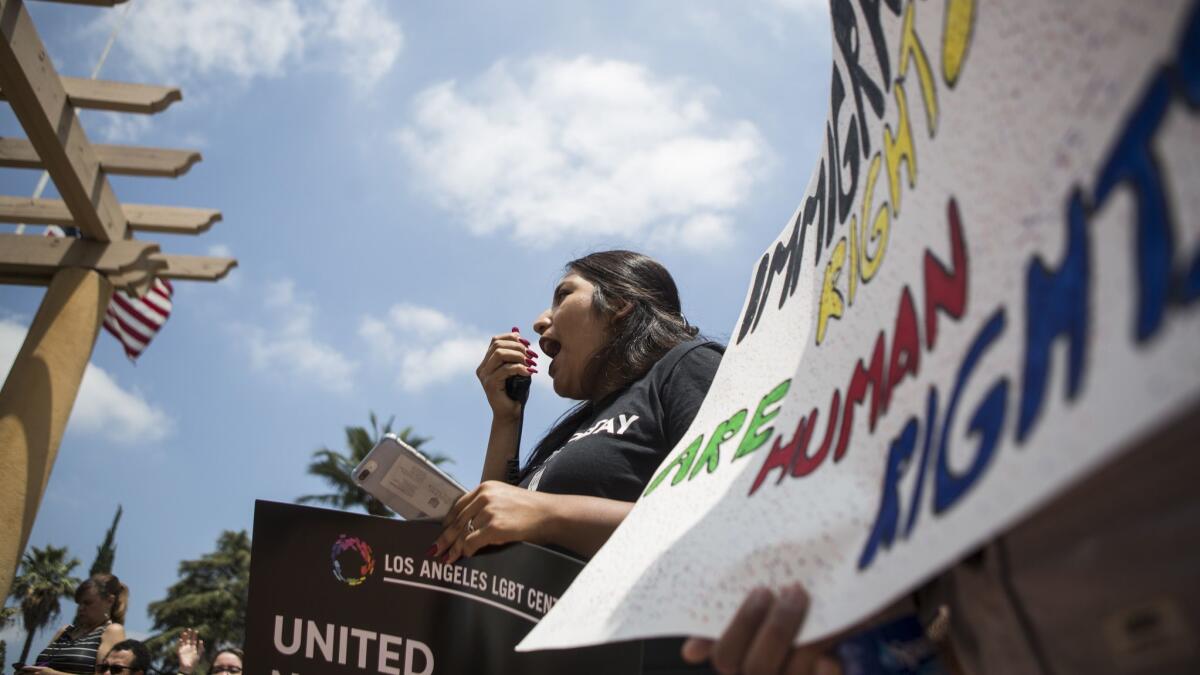9th Circuit hears arguments on Trump administration’s bid to end protection for ‘Dreamers’

- Share via
A federal appeals court seemed concerned Tuesday about the likely harm that would result if the Trump administration’s plan to end protections for so-called Dreamers goes forward, but wrestled with technical legal questions about the judges’ ability to intervene.
During a hearing, a three-judge panel of the U.S. 9th Circuit Court of Appeals acknowledged that the end of the Deferred Action for Childhood Arrivals program, known as DACA, would have significant effects on 700,000 immigrants and their families.
The panel of three Democratic appointees is reviewing an appeal by the Trump administration of a preliminary injunction issued by a San Francisco federal judge in January that required the federal government to continue processing renewal applications of immigrants previously approved for the program.
Judge John B. Owens, an Obama appointee, asked whether the court could uphold the injunction on grounds that were not reached by the district judge.
Although challengers argued that the repeal of DACA amounted to unconstitutional discrimination, they asked for and received a ruling based on the argument that the recision was arbitrary and capricious.
A lawyer for the Trump administration said the 9th Circuit could not reach out to answer the constitutional question because there was no evidence presented on it in the lower court.
A lawyer for the challengers said the court could uphold the injunction on equal protection grounds.
Judge Kim McLane Wardlaw, a Clinton appointee, noted that the Supreme Court had not barred legal challenges of an agency’s “action that disproportionally affects one protected group over another.”
Immigrants from Mexico were the largest beneficiary of DACA.
U.S. Deputy Assistant Atty. Gen. Hashim Mooppan argued that the administration had the legal right to end the program and its discretion could not be challenged on selective enforcement grounds.
Mark Rosenbaum, an attorney for several DACA beneficiaries, disagreed. He told the court that President Trump had been using DACA as a “bargaining chip” for a border wall between the U.S. and Mexico.
“That is not going to happen with Norwegians,” Rosenbaum said. “That is not going to happen with Western Europeans.”
Owens noted that the U.S. Supreme Court’s decision in the so-called Muslim ban travel case would probably give the 9th Circuit lots of guidance in how to resolve the DACA dispute.
He asked why the federal government wanted a quick resolution in the DACA litigation when there was so much at stake.
Mooppan said that the Supreme Court was not likely to rule on the travel ban until late June and the administration, in the meantime, was being forced to give work permits to “700,000 illegal aliens” under a policy it believes is illegal.
“That is an extraordinary intrusion on the executive branch,” he said.
Wardlaw asked how the court should weigh Trump’s tweets about DACA and immigration. She wondered whether the judges should give greater weight to tweets he sent after he took office.
Mooppan suggested the tweets were irrelevant, especially “pre-presidential statements.”
The case stems from lawsuits filed by the University of California, the state of California, Maine, Maryland and Minnesota, individual immigrants and others to block Trump from ending the program.
U.S. District Judge William Alsup ruled that the administration’s decision to repeal DACA was based on a faulty legal premise and should be blocked until the legality of the program is decided.
Twitter: @mauradolan
More to Read
Sign up for Essential California
The most important California stories and recommendations in your inbox every morning.
You may occasionally receive promotional content from the Los Angeles Times.














